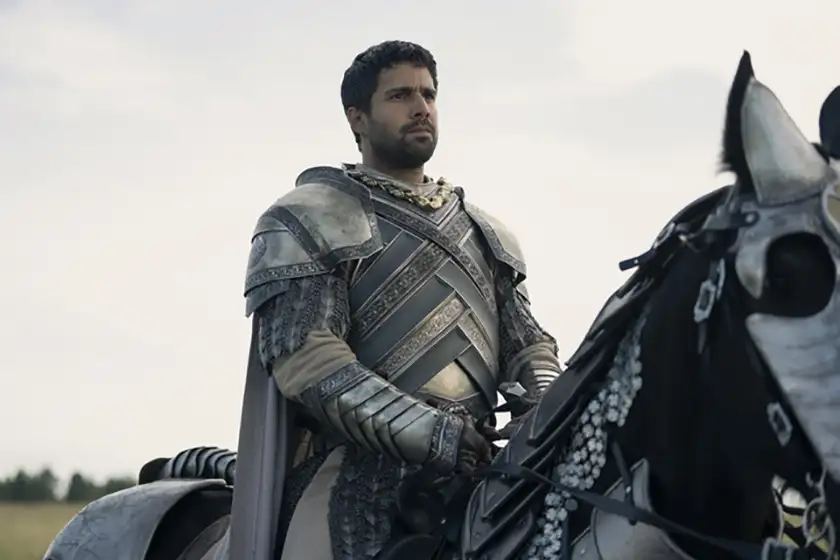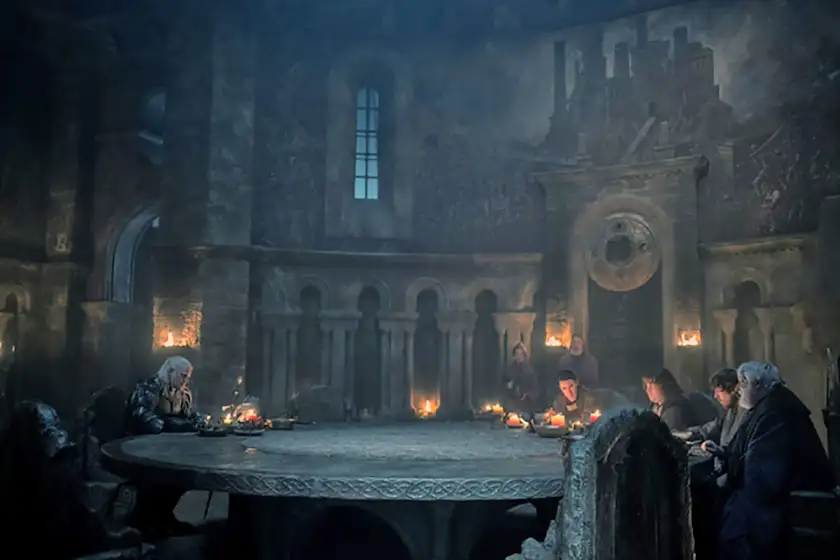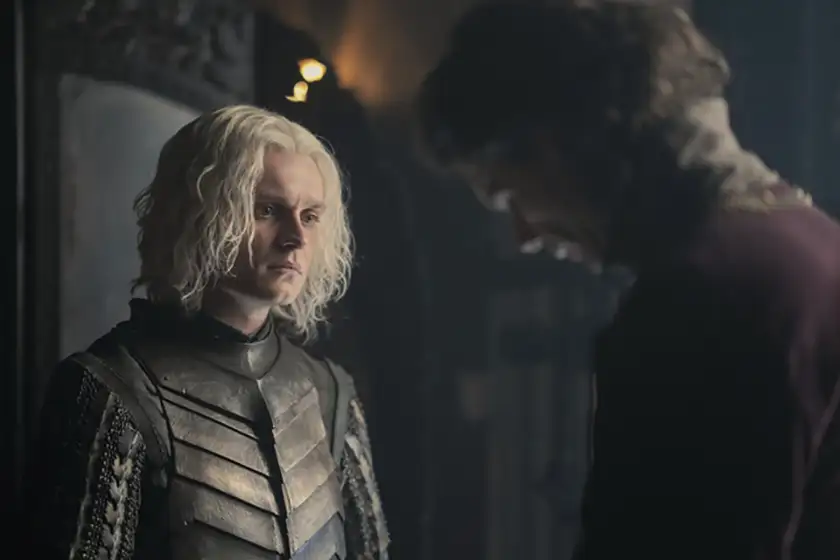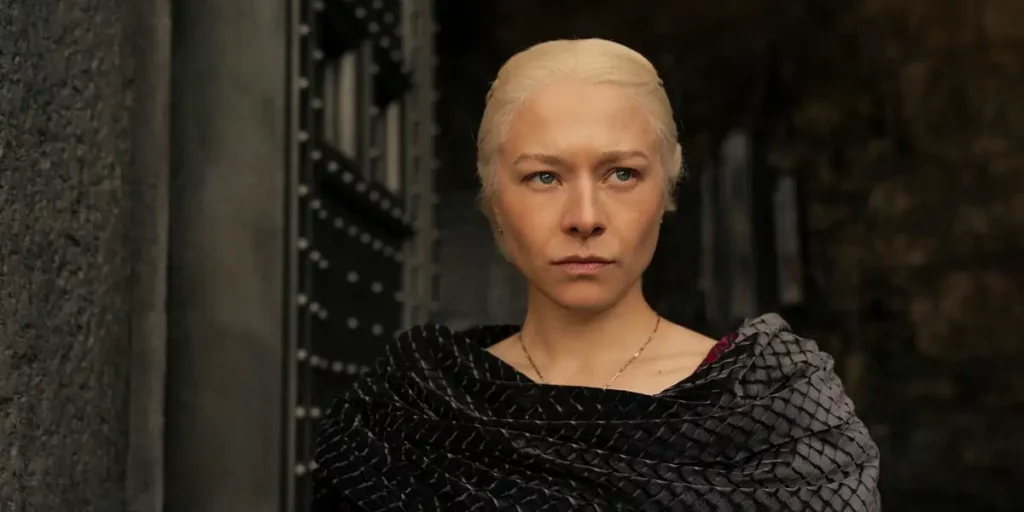We recap and review Season 2 Episode 3 of HBO’s House of the Dragon, where Rhaenyra makes one last ditch attempt to avoid plunging Westeros into the chaos of war.
Spoilers below for Season 2 Episode 3 of House of the Dragon and Fire & Blood, obviously.
Creators: Ryan J. Condal & George R.R. Martin
Number of episodes: 8
Season 2 Episode 3 Release Date: June 30, 2024
Where to watch: Max
Once a single domino falls, the rest will tumble in short order, whether you want them to or not. That’s the theme at the core of Season 2, Episode 3, “The Burning Mill”, which opens by showing us how the war between the blacks and the greens has expanded beyond the shadowy subterfuge of the previous two episodes.
Episode 3 opens on an argument between the Brackens and the Blackwoods, two houses in the riverlands whose enmity stretches back beyond the bounds of living memory. One moment, a pair of hotheaded sons of each house are quarreling over a collection of border stones; the next, one of them lies dead next to hundreds of fallen Brackens and Blackwoods, his own sword thrust through his neck. House of the Dragon’s civil war has begun in earnest, even if both the blacks and the greens are slow to admit it.
On Dragonstone, Rhaenyra (Emma D’Arcy) oversees the burial of two of the war’s earliest casualties, twins Arryk and Erryk Cargyll (Luke and Elliott Tittensor). Rhaenys (Eve Best) tells her that Arryk’s attempt on her life cannot have been the work of Otto Hightower (Rhys Ifans), but the “younger men” who seek revenge. “Soon they will not remember what it was that began the war in the first place,” she says, a point that will be hammered home (perhaps a bit too heavy-handedly) throughout the episode. Rhaenys counsels Rhaenyra to speak with Alicent Hightower (Olivia Cooke), who she believes does not share the same lust for blood that runs amongst the other greens, but the queen does not want to hear it.
Meanwhile, Ser Criston Cole (Fabien Frankel), Lord Commander of the Kingsguard and Hand of the King, is late for the meeting of the small council, perhaps because he is distracted by the newest members of the white cloaks: three drunken layabout friends of King Aegon (Tom Glynn-Carney). Whatever Cole thinks of the new knights under his charge, he keeps it to himself as the small council unanimously criticizes him for his Parent Trap-esque assassination scheme.
Cole is adamant that the boldness of his plan was the better alternative to continuing to hide inside the Red Keep. Ignoring the suggestions of his fellow council members, including his lover the Dowager Queen, Cole declares that he and Prince Aemond (Ewan Mitchell) will muster what men they can and ride to the ruined castle of Harrenhal to secure the riverlands for the greens. King Aegon is shut down when he suggests riding out with them atop his dragon Sunfyre, grumbling, “I’m as fearsome as any of them.” The council’s awkward silence and the involuntary, “Oh” that slips out of Alicent says the quiet part out loud.

Rhaenyra, looking to secure further allies and ensure the safety of her remaining children, decides to send her boys Joffrey, Aegon and Viserys and their dragons Tyraxes and Stormcloud away from Dragonstone. Joffrey will go to the Eyrie in the Vale to stay with Rhaenyra’s cousin Lady Jeyne Arryn while the other boys will continue on to Pentos across the Narrow Sea.
Rhaenyra entrusts the duty of escorting the boys to her step-daughter/cousin (this family tree is truly a circle) Rhaena (Phoebe Campbell), who sees it more as a punishment for not yet having a dragon of her own to ride. Rhaenyra frames it as Rhaena being the mother to her boys that she cannot be right now, and even goes so far as to send her off with four dragon eggs, effectively entrusting her with the future of the Targaryen dragons. A lot of responsibility to shoulder onto a fourteen-year old, to be sure, but Rhaena takes it in stride. It should also be noted that this clutch of eggs is the same that will be presented as a wedding gift to Daenerys Targaryen some two hundred years later, but what might happen to reduce those four eggs to three remains to be seen.
Prince Daemon Targaryen (Matt Smith) finally arrives at Harrenhal atop Caraxes to make good on his promise to his queen. He stalks through the ruined castle’s halls as a storm rages outside; Season 2 Episode 3 director Geeta Vasant Patel expertly shoots the cavernous, dimly lit (although not as dark as the first season!) interiors, emphasizing both Harrenhal’s haunted reputation and the House of the Dragon team’s excellent production design work. It’s always interesting to see how House of the Dragon reinterprets and redesigns locations previously seen in its predecessor show, usually in a more book-accurate fashion, and Harrenhal’s new look is an improvement on already stellar work.
Daemon dispatches a guard with ease and bursts into the grand hall, where castellan Ser Simon Strong (Sir Simon Russell Beale), great-uncle to Larys Clubfoot (Matthew Needham), wisely bends the knee and swears fealty to Rhaenyra immediately. Daemon demands that a raven be sent to the Warden of the riverlands, Lord Grover Tully, requesting that he get the Brackens and Blackwoods under control; Ser Simon claims that Lord Tully is too old and feeble to control his own bowels, much less his bannermen, so the raven will not be of much use.
Daemon asks what began the ancient grudge between the Brackens and Blackwoods; Strong laughs and says, “The answer to that is lost in time. Sin begets sin begets sin.” An obvious thematic underlining if ever there was one, but Beale is so effective as the intelligent and worldly castellan that it makes the somewhat heavy-handed dialogue go down easy.
House of the Dragon can often fall into the trap of having its characters merely exposit information at one another, which certainly describes the dialogue exchange between Daemon and Ser Simon. However, Smith and Beale are such accomplished performers that they find the small character beats buried beneath the info dump, such as when Daemon bristles at being called “my prince” as opposed to “Your Grace”, a title he has no right to claim.

Later that night, Daemon is disturbed by a mysterious figure who pushes against the barred doors of his chambers, but when he flings them open he finds no one on the other side. He follows an eerie, echoing tune down the hall to a sitting room, where he sees young Rhaenyra (Milly Alcock) humming as she sews Prince Jaehaerys’ head back onto his body. “Always coming and going aren’t you? And I have to clean up afterwards”, Rhaenyra says.
Suddenly, Daemon comes to from his waking dream, finding himself in front of the godswood in Harrenhal’s courtyard. What drew him there? And who is the mysterious woman, Alys Rivers (Gayle Rankin), who tells Daemon, “You will die in this place” before disappearing back into the castle? Rivers is one of Fire and Blood’s most enigmatic characters, and Rankin, best known for playing Sheila “The She-Wolf” in Netflix’s GLOW, is an inspired bit of casting.
As Ser Criston prepares his troops to march for Harrenhal, Queen Alicent introduces him to her brother Gwayne Hightower (Freddy Fox). When you see Fox show up, you know that nine times out of ten his character is going to be an arrogant prick, and that certainly proves true with Gwayne, who immediately takes the opportunity to make a backhanded compliment about Cole’s rise from the son of a blacksmith to the Hand of the King. Fox’s performance tells us everything we need to know about Gwayne in just a few lines, and it will be exciting to see how he ribs and puts down the uptight Cole on the road to the riverlands through the rest of season 2.
We even get to see the cracks in his arrogant facade when Baela (Bethany Antonia), patrolling the crownlands atop dragon Moondancer at Rhaenyra’s request, nearly catches and incinerates Criston and Gwayne before losing them in the woods. The fear on Gwayne’s face is palpable as he thanks Cole for saving his life, which Ser Criston seems to begrudgingly accept.
King Aegon wishes to follow his Hand to war atop Sunfyre’s back, even going so far as to fit himself in the armor worn by his namesake Aegon the Conqueror. Larys Clubfoot manages to convince him to stay by claiming that the smallfolk are spreading rumors that he is being manipulated by his small council to leave the city so that Alicent and Aemond can reign in his stead. An obvious lie to be sure, but Aegon has already proven susceptible to Larys’ honeyed words after dismissing his uncle as Hand in the previous episode. Aegon even goes so far as to name Larys his Master of Whisperers, showing how easily he can be manipulated by someone ostensibly showing him the smallest bit of kindness.
Aegon and his mates on the Kingsguard decide to sneak into the city that night to take one of their young squires to the brothels on the Street of Silk. This sequence sees the return of Ulf the White (Tom Bennett) from his brief appearance in the previous episode; here he regales fellow pub patrons with an unbelievable tale, claiming that he is the bastard brother of Daemon and Viserys, a Targaryen “Dragonseed” and uncle to Queen Rhaenyra. He even proclaims that his nephew Jacaerys Velaryon is the rightful heir to the throne just as Aegon and his lackeys walk in, but thankfully they don’t seem to hear him.
There’s a cameo from Dyana (Maddie Evans), the servant girl who Aegon assaulted in the previous season, which ends up adding nothing to the scene and so feels like an incredibly odd inclusion. The main purpose of the sequence comes when Aegon stumbles upon a naked Aemond abed with Sylvi (Michelle Bonnard), the madame of the brothel who first appeared in the previous season.
Sylvi and Aemond’s oddly maternal relationship was established in the last episode, where he confessed feeling regret for killing his nephew Luke. Here, the focus is on Aegon as he cajoles his brother for still sleeping with the same prostitute who took his virginity several years earlier. Aemond, his face an emotionless mask, says that “One whore is as good as another” and leaves. Mitchell proves once again how adept he is at playing the years of repressed pain of being the second son to the feckless idiot that is Aegon.

Even after Baela gives Rhaenyra the news that Aegon’s army is on the move, the queen still refuses to commit to all-out war, to the protestations of her own small council. Rhaenys’ words about how the desire to kill and burn will drive all men to madness seem to be ringing in Rhaenyra’s ears, as she must constantly dissuade those on her council who try to convince her to send her dragons to destroy the greens. At Rhaenys’ insistence, she finally reads the message that Alicent sent to her shortly after Lucerys’ death. We don’t see what it says, but apparently it’s enough to convince Rhaenyra to sue for peace with her former best friend one last time.
Mysaria (Sonoya Mizuno), having now entered Rhaenyra’s service as a reward for saving her life from Arryk Cargyll, tells Rhaenyra how she might enter King’s Landing unnoticed and catch Alicent outside of the Red Keep. The queen and one of her Queensguard enter the city disguised as members of the Faith, and in what is arguably the set piece of Season 2, Episode 3 and one of House of the Dragon’s biggest deviations from its source material, Rhaenyra finds Alicent within the grand sept – and they talk.
More specifically, they talk of peace, or at least try to. Even though neither of them desire the war and bloodshed that the men around them seek, Alicent rejects the idea of terms out of hand, especially because from her point of view, Viserys changed his mind about which child he wanted to succeed him. Despite Alicent’s insistence that she would not lie about this, Rhaenyra pushes back and demands to know if Viserys said her name when supposedly revoking her claim.
Alicent says that it was hard to understand the king, but that he mentioned something about Aegon being the prince that was promised to unite the realm. Rhaenyra perks up at this, thinking that this means that Alicent knew of the Song of Ice and Fire, the prophetic dream that Viserys described to Rhaenyra when he named her heir. Apparently, Aegon the Conqueror dreamed that a great threat would come from the north that only the blood of the dragon could defeat, which was why he conquered Westeros in the first place. This secret prophecy has been passed down from Targaryen heir to Targaryen heir since the Conqueror’s day.
Rhaenyra has spent half of her life with the knowledge of this prophecy, believing that it was her duty to lead a united Westeros against this existential threat. It is this belief that has kept Rhaenyra from bathing the realm in fire and blood. When she describes the prophecy to Alicent, the two women come to a simultaneous realization: Viserys was speaking about Aegon the Conqueror, not his son Aegon, and he remained steadfast in his support of Rhaenyra’s claim until his final breath.
A range of emotions flashes across Alicent’s face; Cooke does a brilliant job of conveying the Dowager Queen’s realization of just how deeply she has messed up here. The entire realm teeters on the brink of chaos, all because she misunderstood a dying man’s final words. Yet she knows that it is far too late to undo what has already been done, and she tells Rhaenyra as much.
Alicent could have had Rhaenyra captured and killed right then and there, but instead she gives her an opportunity to escape. It’s a decision that feels more rooted in character and much less contrived than Rhaenys’ refusal to incinerate all of the greens during Aegon’s coronation last season. Even though Cooke and D’Arcy didn’t take over their respective characters until after Alicent and Rhaenyra’s friendship had already fractured, they have both always done an excellent job of conveying the deep love that these women still hold for one another. It’s why it makes sense that Rhaenyra thinks that appealing to Alicent might be the realm’s last chance for peace, and it’s why it’s even more heartbreaking when they both realize that this conflict is past the point of no return.
House of the Dragon affirms in Season 2, Episode 3 that it shines the most when taking deviations from the source material, either big or small, to chart its own path. All of these changes, whether it be Daemon’s vision at Harrenhal or Rhaenyra’s conversation with Alicent, serve to deepen the characters, a necessary counter balance to the spectacle, exposition and table setting. That table setting was starting to feel like a weight around the show’s neck; while Rhaenyra’s motivation for avoiding all-out war became clear by the end of Episode 3, her reluctance was starting to feel redundant in a way that felt like the show was spinning its wheels.
Now, the table is set, and the dominoes are cascading down. All that’s left to do is watch how they fall.
House of the Dragon Season 2, Episode 3, “The Burning Mill”, is now available for streaming on Max. Join us next week for our recap & review of episode 4!
Season 2 Episode 3 of House of the Dragon is now available to watch on Max. Read our reviews of Season 1 of House of the Dragon and find out why Helaena’s choice is a good change from the books!

